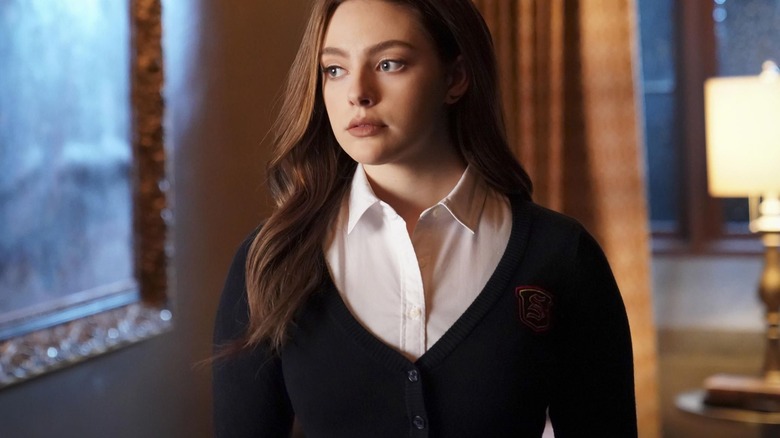Why The CW Cancelled The Vampire Diaries Spin-Off Legacies
When "The Vampire Diaries" hit The CW in 2009, the network had no idea how this YA dark fantasy series would be received. Vampire narratives on television weren't exactly a novelty at the time, as mega-popular shows like "True Blood" and "Buffy the Vampire Slayer" were already exploring intriguing facets of the genre. Then there was the "Twilight" of it all, amassing mainstream attention (and scrutiny) with its focus on teen supernatural romance and the challenges of girlhood.
So when "The Vampire Diaries" opened with a young Elena Gilbert (Nina Dobrev) struggling with grief while being entangled with two vampire brothers, the show's premise ran the risk of retreading stale genre tropes. However, eight seasons and a spin-off (2013's "The Originals") later, "The Vampire Diaries" emerged as the face of teen-centered vampire drama that wasn't afraid to venture into dark corners. Despite its flaws, the series promised a bold, exciting world teeming with chisel-jawed characters contending with their worst impulses in a dreary, unpredictable landscape. While the series was still ongoing, "The Originals" brought fresh stakes (no pun intended) to the franchise, fleshing out the tense supernatural politics gripping the French Quarter in New Orleans. The series follows the Mikaelsons — the world's first vampires who have sired every vampire to ever exist — and their efforts to take back control of the city.
"The Originals" spawned a spin-off of its own in 2018 called "Legacies," featuring Hope Mikaelson (Danielle Rose Russell), the tribrid (!) daughter of vampire-werewolf hybrid Klaus (Joseph Morgan) and the werewolf-turned-hybrid Hayley (Phoebe Tonkin). Unfortunately, the show was canceled after four seasons, and this effectively brought about the end of "The Vampire Diaries" as a franchise. What is "Legacies" about, and why was the show canceled?
Legacies is a lighthearted vampire drama with a fun premise
Melodrama lies at the core of "The Vampire Diaries" universe. Star-crossed doppelgangers exist across time only to love and be torn apart, innocent bystanders get dramatically bitten and discarded by the undead, and the most fickle romantic dynamics form and un-form within a matter of days. The parent show undoubtedly embraces this self-serious campiness to great effect, as most of the characters are teenagers who feel lost in a world where creatures lurk in the dark. The 1,000-year-old vampires, witches, or werewolves don't fare any better, as they succumb to the same dramatic impulses that govern their instinct-first natures. Even the mature, grown-up tint of "The Originals" relishes these eccentricities, which are heightened when heads are casually snapped or hearts are ripped out without remorse. Monologues accompany every action, where every emotion is verbalized through snarky, punchy comebacks laced with grief and pain.
This deliberate excess works. Both "The Vampire Diaries" and "The Originals" perfected this formulaic approach to the genre, working in tandem to create a world with its own outlandish rules. "Legacies" broke the mold by offering respite from this intensity, adopting a delightful monster-of-the-week formula while never taking itself too seriously. Although Hope, the show's protagonist, was at the nexus of dark, terribly drawn-out conspiracies in "The Originals," her spin-off show sheds these dark clouds and opts for something lighter.
This fresh approach yielded mixed results. On one hand, it offered respite from the expectations of the franchise, but on the other, the formula started to feel stale by the time the third season rolled out. In this particular instance, less was not more, as Hope's toils hinged on external threats as opposed to intense internal conflicts.
Although "Legacies" has a great supporting cast of characters, they never feel as fleshed out as they should have. When things start to pick up, Hope's journey feels a little too divorced from her, um, legacy, and the show's final season feels like a natural conclusion instead of an abrupt one. Nevertheless, the show's cancelation marks the end of an era, along with that of a fictional universe that proved that vampires can never go out of style.

